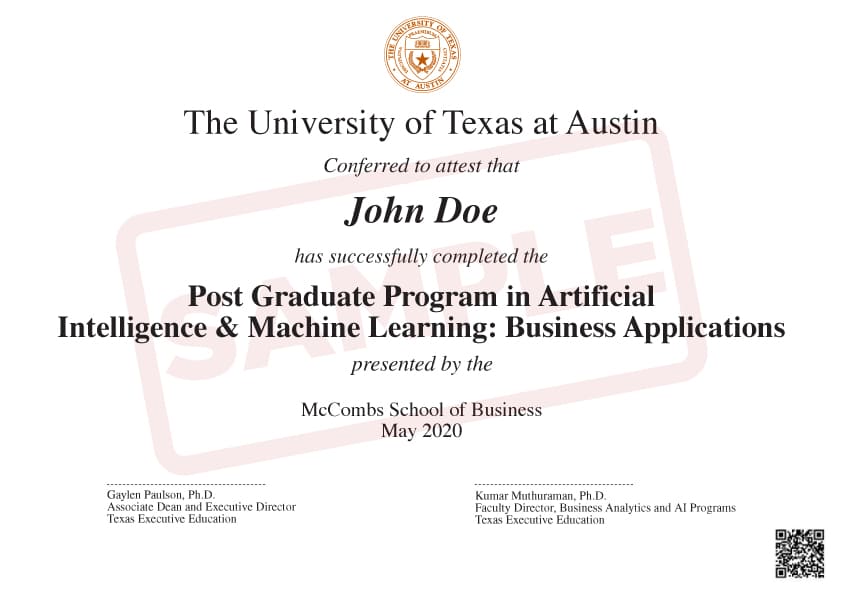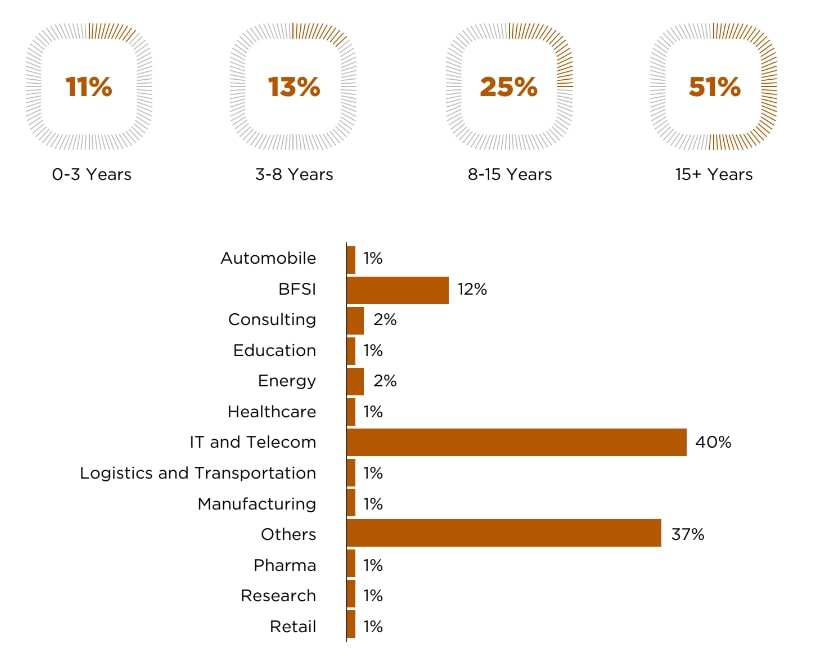Post Graduate Program in AI and Machine Learning: Business Applications
Artificial Intelligence (AI) and Machine Learning (ML) are two key developments in computer science and data processing that are disrupting a wide range of sectors. Machine Learning is a subset of Artificial Intelligence that enables a system to automatically learn from prior data without explicit programming. AI aims to create intelligent computer systems that can address human challenges, processes, and technology issues.
The potential of Artificial Intelligence is expected to significantly increase workplace productivity and expand the range of tasks people can perform. As AI replaces tedious and monotonous tasks, the human workforce can focus on projects that, among other things, require creativity and empathy.
Though many online AI ML courses provide a conceptual understanding, they fall short in preparing learners to know what skills organizations look for and the opportunities to tap. To address this, faculties at the University of Texas at Austin and Great Learning have designed the Post Graduate program in AIML with the flexibility of an online program while maintaining the academic rigor, hands-on learning, program assistance, and peer interaction of a full-time course.
Why learn Artificial Intelligence and Machine Learning?
- The AI market will be valued at $15 trillion or more by 2030.
- Artificial Intelligence will generate 58 million jobs by 2022.
- AI in business will bring in $118.6 billion annually by 2025.
- 86% of rapidly expanding organizations believe AI is critical to their success.
Key Highlights Of the Program
An online classroom that delivers lectures in recorded and interactive mentored learning environments with hands-on practice alongside.
Top-rated academia from UT Austin and experts in the field of Artificial Intelligence and Machine Learning have designed the program to adopt the latest practices.
Practical learning helps you prepare to make data-driven decisions on business problems and solid theoretical foundations. Receive personalized mentoring every weekend from professionals and industry experts in the Artificial Intelligence and Machine Learning fields as you solve real-world business problems.
- Portfolio Building Projects
Create a portfolio comprising assignments, exams, case studies, and industry-oriented projects relevant to your field to demonstrate your skills to potential employers.
Program Design: Post Graduate Program in AIML - McCombs Business School
Great Learning offers the 7-month Post Graduate Artificial Intelligence and Machine Learning certificate course in collaboration with McCombs University at UT Austin. This program is designed to impart comprehensive knowledge in implementing AI applications and successfully build a career in Artificial Intelligence and Machine Learning. This program includes 12 modules and comprises 8+ projects.
This Post Graduate Program in AIML includes a Programming Bootcamp to help learners with no prior coding experience to acquire foundational programming skills. It covers the fundamentals of AIML along with in-depth understanding of Supervised Learning, Ensemble Techniques, Feature Engineering, Model Section and Tuning, and Unsupervised Learning.
Learners will also delve deep into various machine learning modules such as Neural Networks, Computer Vision, Natural Language Processing, and Statistical Learning and enhance their ability to develop real-time solutions for industry-specific problems. This program also includes the Recommendation System module to cover the Business Analytics application of AIML and the Model Deployment chapter to comprehend learners’ knowledge on developing scalable, robust, and future-friendly solutions.
Learning Outcomes
- Gain in-depth knowledge of the most popular AI and ML tools and technologies.
- Proficiency in using AI and Machine Learning to solve business problems on your own.
- Gain practical experience required to create Deep Learning and Machine Learning models.
- Recognize the potential and effects of Artificial Intelligence in various businesses.
- Develop an exceptional work record and an industry-ready AI and ML portfolio.
- Lead the implementation of artificial intelligence in your existing role within the organization.
- Set a successful career in Artificial Intelligence and Machine Learning
Who is this UT Austin Machine Learning and Artificial Intelligence Program for?
- Professionals and students who prefer to approach complex business problems by adopting modern technology.
- Learners that are at ease working with sophisticated algorithms.
- Learners with little or no prior programming knowledge
- Learners interested in developing AI and ML applications integrated with technical innovations.
Reviews: PGP AI ML UT Austin (Program Reviews)
This Artificial Intelligence and Machine Learning course has continued to transform thousands of careers and stood testimonial in the past few years. The learners for this course are from varied backgrounds and professions.
About the University of Texas at Austin
The University of Texas at Austin is perhaps one of the leading public universities in the globe, hosting 51,000+ students and 3000+ world-class faculties. UT Austin is known across the world as a pioneer in the fields of social science, business, technology, and science. With an established track record of success, cutting-edge research, and teaching methodologies, you can be confident that you are learning from the finest academicians and researchers. UT Austin also offers an AI for Business Leaders program to those seeking to lead in this ever-evolving domain. (Explore AIFL Program)
AI ML Courses - Great Learning (Explore AI ML courses)
Artificial Intelligence and Machine Learning have, since the beginning, been the most promising and rapidly expanding subfields in computer science. The best Artificial Intelligence courses from Great Learning will equip you with the knowledge and skills needed to continue to be a pioneer in this quickly evolving discipline. You will acquire hands-on experience with cutting-edge tools and techniques while learning about the most recent AI research, algorithms, and applications from world-class universities, top-rated academia, and research experts. These programs are an excellent approach to get started if you want to start a career in AI or stay up to date on the newest advances.



 Speak with our expert
Speak with our expert

















 PG Certificate from UT Austin
PG Certificate from UT Austin  No university certificate
No university certificate 






























































